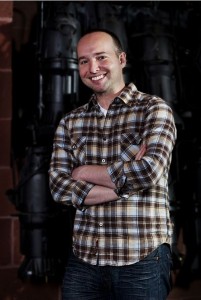
Playwright Jordan Harrison isn’t scared of the rise of technology—in fact, he’s embracing it. His latest play, Marjorie Prime, which runs Sept. 10–Oct. 19 at Center Theatre Group’s Mark Taper Forum in Los Angeles, posits a futuristic world in which an intelligent computer, called a “prime,” can serve as a human surrogate after a person dies. “There’s something about computers that are a monument to people,” Harrison says. “They will remember our humanity after we’re gone.”
Inspired by Harrison’s grandmother, the play’s title character is in end-of-life care, and to maintain her memory, she speaks to a “prime” of her late husband. Marjorie’s daughter, Tess, fears her mother’s dependence on this technology, though she’s more scared of how losing her mother will affect her own life.
It was after he read Brian Christian’s book The Most Human Human—about the Turing test, an exercise in which the same question is posed to a human and a computer, and a third party decides which answer came from the machine—that Harrison took a stab at writing a two-hander between himself and a computer chat program, though he quickly learned technology isn’t quite that sophisticated. Yet.
“I usually start with a kind of high concept and the play moves away from it,” he explains. “As things are going well, the characters draw me away from that concept. Otherwise you end up with a math proof at the end.”
This isn’t the first time Harrison has tackled technological questions on stage, and he considers Marjorie Prime the third play in an unofficial trilogy on humanity and technology, after his plays Futura and Maple and Vine. So how does he think we should respond to this technological age? “Computers will just keep getting better,” Harrison posits. “The only thing we can do is get better at being human ourselves.”

